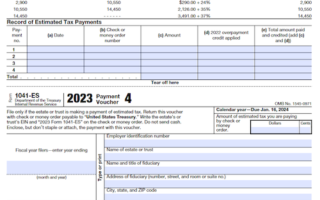Form 8889 is used to report Health Savings Account (HSA) contributions, figure out tax deductions, report distributions, and figure out income you must include and additional tax you may owe if you are not an eligible individual.
What is Form 8889?
Form 8889 is an IRS form used to report health savings account contributions, distributions from HSAs, and amounts to be included in income if an individual fails to remain an eligible individual. An eligible individual must be covered under a high deductible health plan (HDHP) and cannot be enrolled in Medicare, be another person’s dependent, or have any other health coverage except certain disregarded coverage. The form is used to pay qualified medical expenses for the account beneficiary, spouse, and dependents, and must be filed with your income tax return if any contributions or distributions were made for the year.
IRS Form 8889 – Who Needs to Fill It Out?
Anyone who made contributions or received distributions from a health savings account (HSA) in the year 2022 must fill out Form 8889. Eligibility to make contributions to an HSA is based on being covered under a high deductible health plan (HDHP) and having no other health coverage other than certain disregarded coverage. Furthermore, to take advantage of the last-month rule, an individual must remain an eligible individual during the testing period beginning with the last month of their tax year and ending on the last day of the 12th month following that month. If an individual fails to do so, they will have to include income the total contributions made and be subject to a 10% additional tax. Finally, the form must be filled out in cases when the account beneficiary’s death triggers an acquisition of the interest in the HSA.
Step-by-Step: Form 8889 Instructions For Filling Out the Document
To fill out Form 8889, you must be an “eligible individual” with a High Deductible Health Plan (HDHP) and no additional health coverage. This form should be filed if any contributions are made to the HSA in 2022, you receive HSA distributions in 2022, you fail to be an eligible individual during the testing period, or if the account beneficiary dies. Specific instructions include filing the form with a 1040/1040-SR/1040-NR, and providing details such as a beneficiary’s name, Social Security number, and qualified medical expenses. Deemed distributions from the HSA are also reported, such as those from prohibited transactions, ceased accounts, or loan security, all of which are subject to the additional 20% tax. Last, rollovers from one HSA to another must occur within 60 days.
Below, we present a table that will help you understand how to fill out Form 8889.
| Form 8889 | Instructions |
|---|---|
| To fill out Form 8889, you must be an “eligible individual” with a High Deductible Health Plan (HDHP) and no additional health coverage. This form should be filed if any contributions are made to the HSA in 2022, you receive HSA distributions in 2022, you fail to be an eligible individual during the testing period, or if the account beneficiary dies. Specific instructions include filing the form with a 1040/1040-SR/1040-NR, and providing details such as a beneficiary’s name, Social Security number, and qualified medical expenses. Deemed distributions from the HSA are also reported, such as those from prohibited transactions, ceased accounts, or loan security, all of which are subject to the additional 20% tax. Last, rollovers from one HSA to another must occur within 60 days. |
|
Do You Need to File Form 8889 Each Year?
Yes – if anyone, including yourself or your employer, made contributions to your HSA in 2022, you must file Form 8889 with Form 1040, Form 1040-SR, or Form 1040-NR. You must also file this form if you have received any distributions fromHSAs, or have included certain amounts in income because you failed to be an eligible individual during the testing period. If the account beneficiary dies, you must still file Form 8889 but use the instructions for death of the account beneficiary. Any deemed, rollover, or transfer distributions must also be reported on Form 8889.
Download the official IRS Form 8889 PDF
On the official IRS website, you will find a link to download Form 8889. However, to make it easier for you, we are providing the link in our article, which comes directly from the official irs.gov website! Click to download: Form 8889
Sources:




